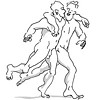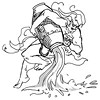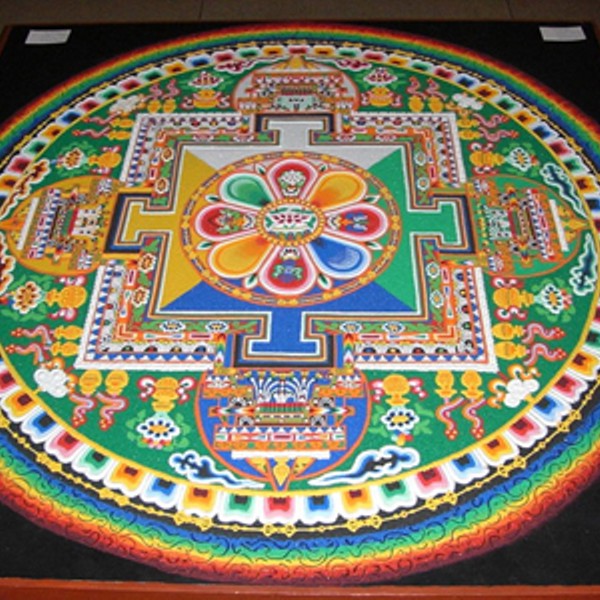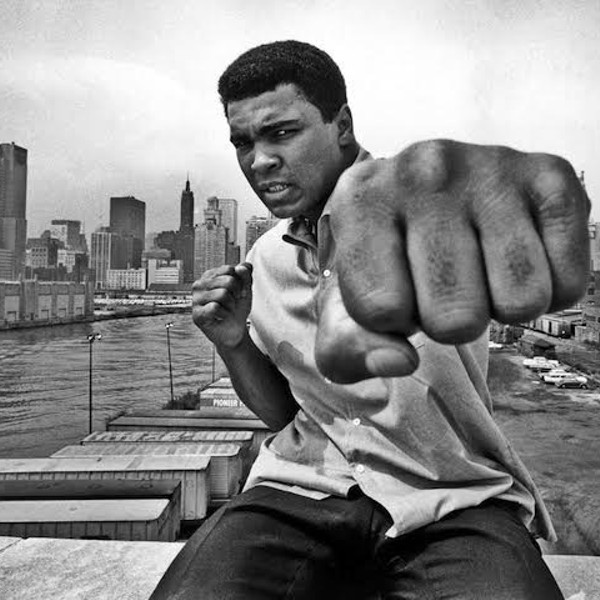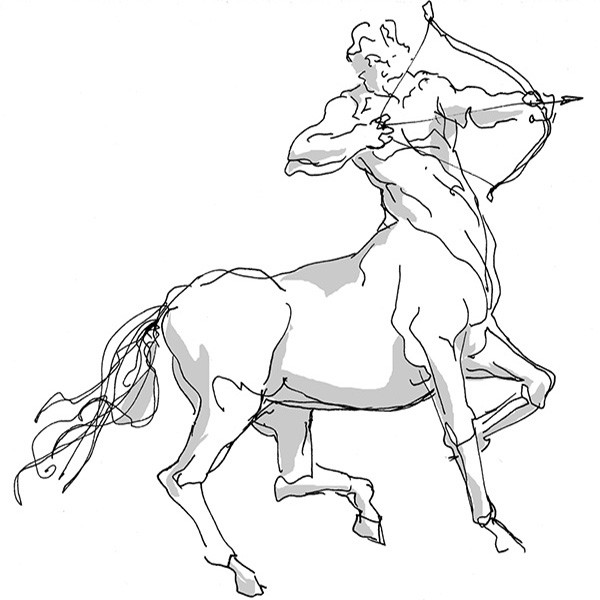As the world churns, the rest of the solar system keeps moving, silently and dependably. As it does, the current positions of the planets make what are called "transits" to our natal chart—they touch and act on the positions of the planets when we were born. Many transits happen to everyone each year, but there are some events that stand out in the course of a lifetime.
One thing is for sure: These transits arrive, and when they do, the thing to do is meet them with clear intent and willingness to grow.
Most of the major transits (sometimes called key life transits) that astrologers work with involve the slow movers: Saturn, Uranus, Chiron, Neptune and Pluto. Howard Sasportas once described these as the gods of change, because when they come through our lives, our lives become different.
They are moments of transformation, and though not everyone has a "good time" going through them, with astrological help they can be easier, more meaningful and more consciously useful. It's rare, however, that people have astrological help or even the most basic information available to them.
Most people know of at least one key life transit—thanks to the Internet, "Saturn return" is a household phrase. That's the transit that happens when Saturn returns to its own natal position in your chart, completing a full 29-year cycle—one of the most meaningful steps on the way to adulthood. The second Saturn return is about restructuring one's life on the way into later adulthood (what used to be called "retirement"). There are a number of other Saturn transits as meaningful as the return, so if this theme resonates but you're at a different age, you may be having one of them.
A Misunderstood Planet
Saturn may be the most misunderstood planet. Associated with structure, authority, and stability, Saturn has been called many things by astrologers that have propagated considerable unnecessary negativity. I consider Saturn to be the internal governing principle. If you structure and run your own life, you won't need someone to do it for you.
While you may hear Saturn associated with being stuck, there are few more dependable agents of change and progress than this planet. For those who fear loss, I would remind you of the words of Patric Walker, who suggested that Saturn always gives more than it takes away.
One of the most significant elements of Saturn is the structuring of time. Both the themes of "time" and "structure" are from old delineations, but the structuring of time is something I've adapted from the work of Dr. Eric Berne. In his book Games People Play, he describes the ability to structure time as a necessary prerequisite for sincere intimacy. We do not live forever, so if we want time enough for love, we have to make space for that experience. That's a necessary element of maturity.
With Saturn it's necessary that you do your part, and then it will do its part. This is to say, consider the themes I've mentioned. Be real to yourself and to what is indicated in your Saturn placement as you grow to understand it, and you'll be at a considerable advantage over others without this understanding. There are often associations with parents where Saturn is involved, and in this respect the message is simple: Resolve your relationship to them. Don't let them run your life vicariously, and know when you're aspiring (whether consciously or otherwise) to be them.
The transits of Saturn have a few themes in common—development of maturity, adjusting the structure of our lives, and focusing on the work that we do. Along with these themes, people undergoing Saturn transits will often experience changes or rearrangements in their relationships. This falls under the general heading of maturity and structure.
I know people who refuse to have intimate relationships with those who have not had their Saturn return; they are often too much like kids. When the Saturn return is done consciously, this is a transit that can help people settle into more grounded and mature attitudes and values. Your relationship to responsibility and the world around you is rearranged, usually in helpful ways.
That said, I suspect that the newest Saturn in Scorpio subgeneration is struggling a bit with these themes, owing mainly to the state of the world. I recently read that fully one-third of American adults are either unemployed or have given up looking for work. This placement lends itself to serious, clever, and committed people who take using their resources wisely as a cornerstone of their lives, in a world that seems to be squandering everything it has.
These natives are emerging into adulthood in a world where there is a radical imbalance in the distribution of resources—such as exponential gaps between the pay of CEOs and ordinary employees. They watched the leaders of the banking system nearly cripple the economy and bankrupt the federal government, then the banksters walked away not only without prosecution but with millions of dollars in personal gain. They know it's wrong.
The Saturn Structure
This is also one of the first crop of Saturn return people who grew up with the Internet. This has consumed many more jobs than it created and has fostered an environment where people could entertain themselves into oblivion.
Many of the people they see doing the entertaining have been catapulted to instant fame and fortune, and one thing that can hold back current Saturn return people is the expectation that this might happen to them. However, most (not all but most) very young people who find themselves living glamorous lives didn't get there by mastering Saturn; they had something else going for them, and the adults around them provided the Saturn structure. This is one reason why so many famous young people cannot stay out of trouble.
Meanwhile, it's difficult to imagine a subgeneration that's seen more change in its short lifetime than this one. Between the day they were born and the day of their Saturn return, the world had gone through more revisions, renovations, and recreations than all the open-source software combined. They are used to a world where something is new and exciting one day and irrelevant the next—and that won't get you far with Saturn.
If there seems to be nothing to hang onto or no easy way in, that's not an illusion. It's a difficult fact of life that they must face. When they are ready to start taking on serious work assignments, there are fewer of those opportunities than ever. It's particularly cruel that those who sought an education are saddled with more college debt than any generation that came before them, with fewer work opportunities to help them pay off that debt.
One of my readers described her dilemma eloquently. "All the possibilities available seem to overwhelm my ability to embrace even one of them fully. Which keeps me away from intimately relating to what is in front of me, whether it's a partner, an idea, a possibility."
She continued: "The fear of death seams to be pushing for a strong desire to accomplish something. An obsession with the future, and what to do to get there. The urge to share the body of artwork I have built up the last few years and to share the wisdom of the person I have become. At times, I even sense an imminent death, then an intense anxiety arises, of not having shared to the world my art, my love, and my vision for the world and all people.
"I have a strong sense of who I am and what I am here to do. But it is the urge to do it and the fear that I won't that is so prominent over the last weeks. The pressure feels as if it's a one-time opportunity to grow up into what I will become."
It's Not Possible to Be Mature Enough
Those in their second Saturn return, in their late 50s, must really be looking at society in bewilderment right now. Those born in the mid-1950s were some of the original "save the world" people—they were teenagers at the time of the first Earth Day, and those impressions never left them—but there's a big mystery where the idealism went.
Their older siblings helped stop the Vietnam War, so they had the notion that social justice was possible. Now many more major wars later, none of those ideals have come to fruition. My sense is that many are ready to take up the good fight perhaps for the first time, now that their children are grown and many are watching their grandchildren grow up in an extremely uncertain, increasingly dangerous world. They, too, are struggling for a way into meaningful participation, but the shock must be even greater because they've lived through many phases of history when that participation really was possible.
There is the pressure of leadership, because at the second Saturn return, one truly becomes an "elder" in society—one entrusted with moral leadership. And unless they've had very successful careers, their plight for survival is often harder than those who are at their first Saturn return. In this world it's not possible to be mature enough.
Yet I think that if they are able to use the restructuring power of Saturn and not succumb to the pessimism that really is possible with Saturn in Scorpio, they will be able to provide a solid foundation for the generations that came after them. They are not too old to think for the future, and future generations are counting on it.
Meanwhile, there are many deep personal issues that call for resolution when Saturn in Scorpio is aspected by itself or by another planet. By the second Saturn return, the confrontation with fertility and sexuality is not as potent as the confrontation with mortality, as those experiencing it see many of their elders depart the planet, sometimes in groups. One difference between the first and second Saturn returns is that at the second, the thought of mortality is less an abstraction and more a reality. Many of my readers have commented about what it's like to see their elder relatives in decline.
Physical health is usually a greater concern at the second Saturn return. Yet despite this, many at this time seem to start their lives over, get divorced, and begin new relationships, change careers, and even go back to school to develop additional skills.
The Rock in the Stream
For those with Saturn in Scorpio at either Saturn return, there may be titanic questions about the role of sexuality and relationships in their lives, which are now coming to a boil. For people entering their second Saturn return, subject matter that was seemingly left behind during their 30s can come right back, seeking attention and healing. Perhaps people are not expecting to explore questions about sexuality or their sexual legacy in their late 50s, but we are, after all, talking about Scorpio here.
I've been doing some reading in the old astrology texts, and all authors who have commented on Saturn in Scorpio have noted its deep feelings and its tendency to secrecy—these individuals don't give up their pearls easily, whether black or otherwise. Now those feelings and secrets are working their way to the surface, and this may leave those with this placement feeling especially vulnerable and asking the deepest questions of their lives.
And then there can be the dawning of that elusive thing, wisdom. As one of my readers wrote recently, her life "would be most dramatic if it weren't so quiet here, in my body and person and whereabouts. I've spent the last decade building a house. Now it's about done. I have a home, something I've wanted since childhood. Mostly, I have equanimity, a quality that always eluded me, that I've often prayed for, and this translates into more confidence, more of a feeling of myself and not a cloak or a ghost."
She continued: "I started reading poetry again. I used to be a woman who sought advice everywhere, and now I'm the rock in the stream, all the chaos flowing around and over me. I don't have to attend so many seminars, read so many books, which makes for more time."
Ah yes, were it so. Were it so.












